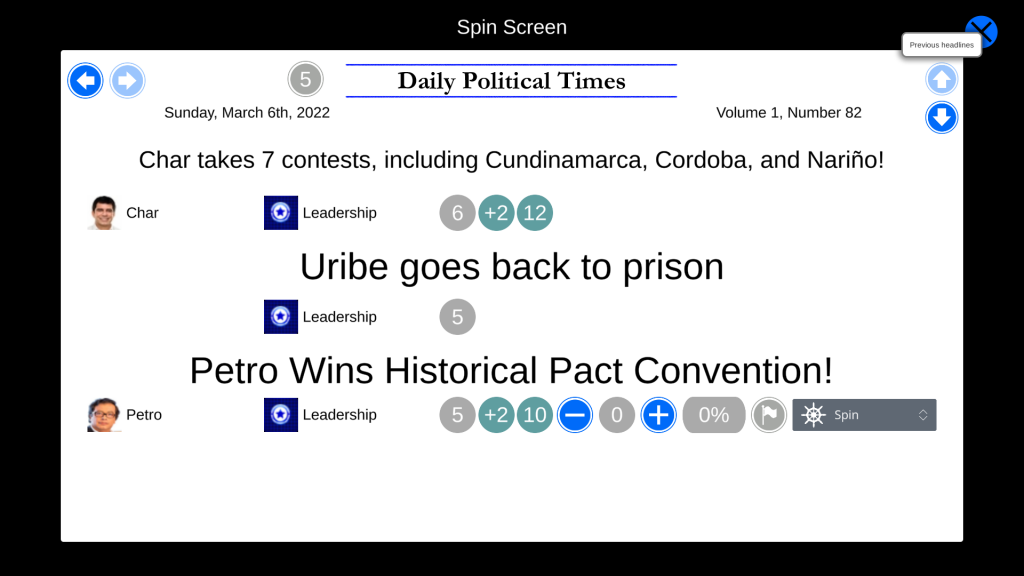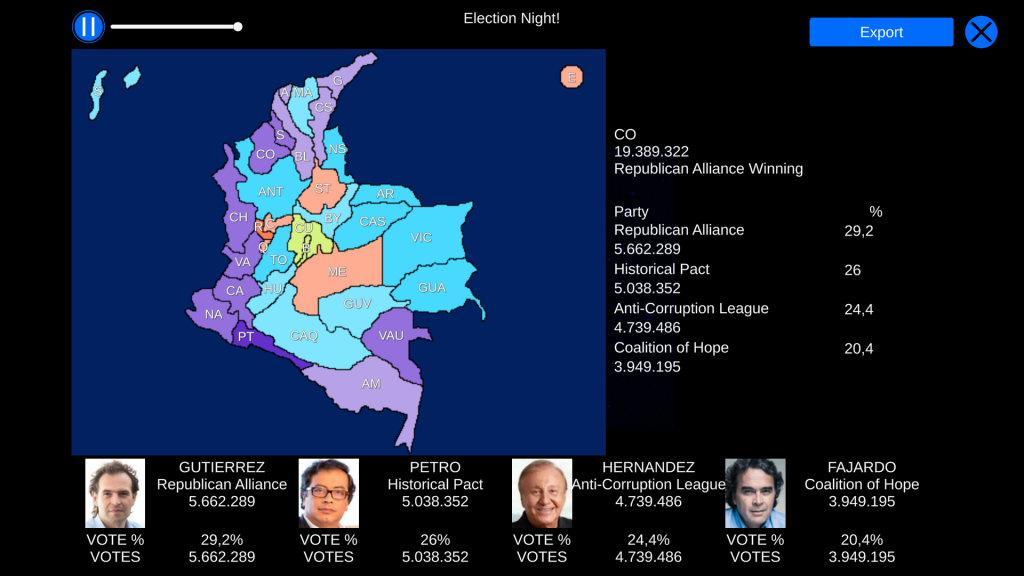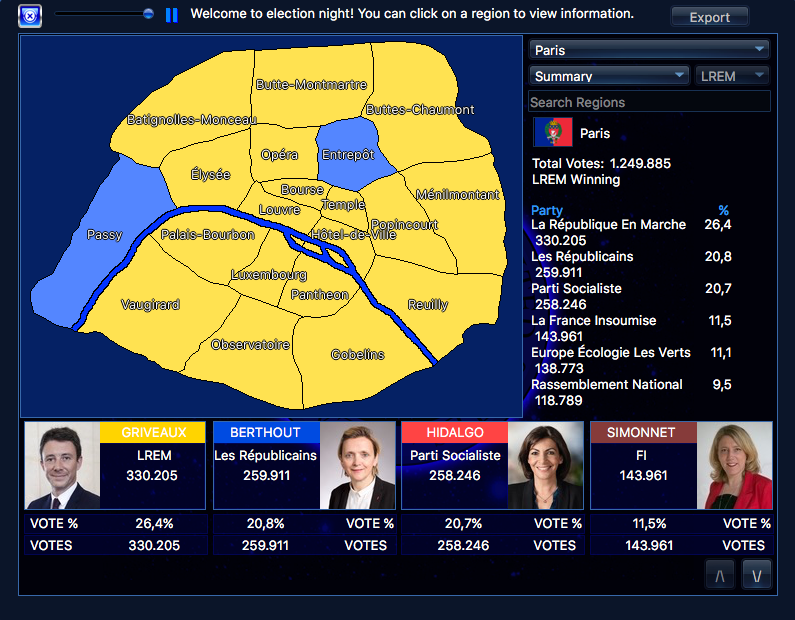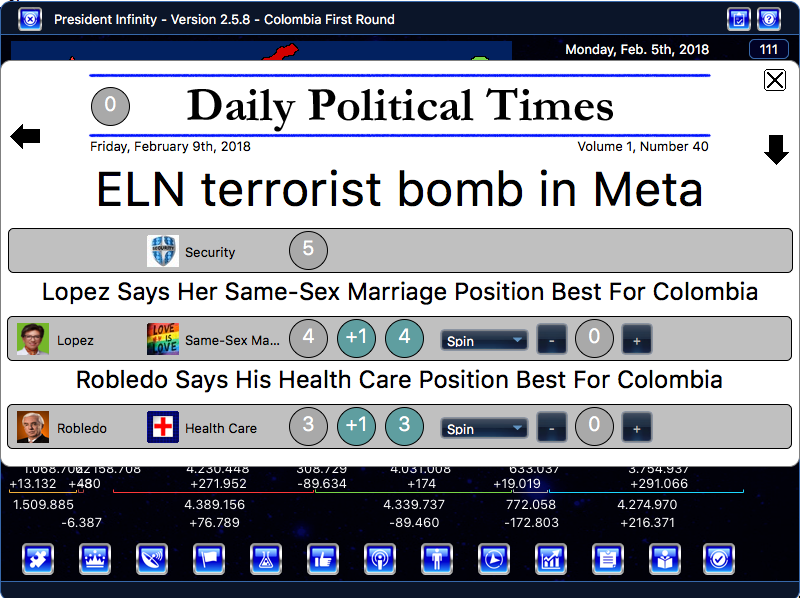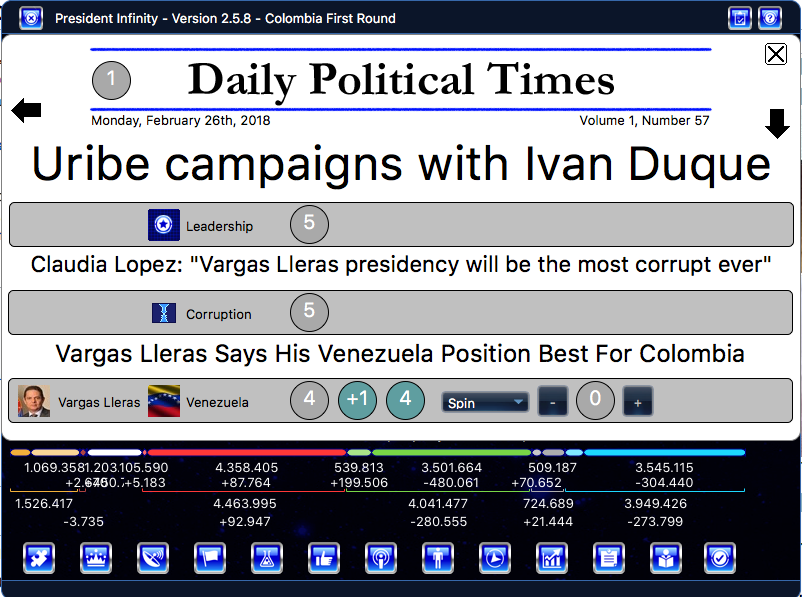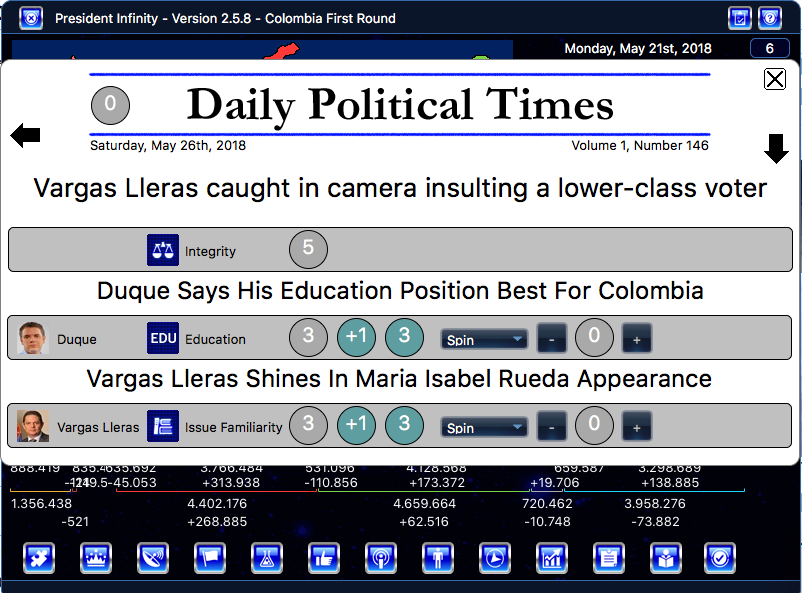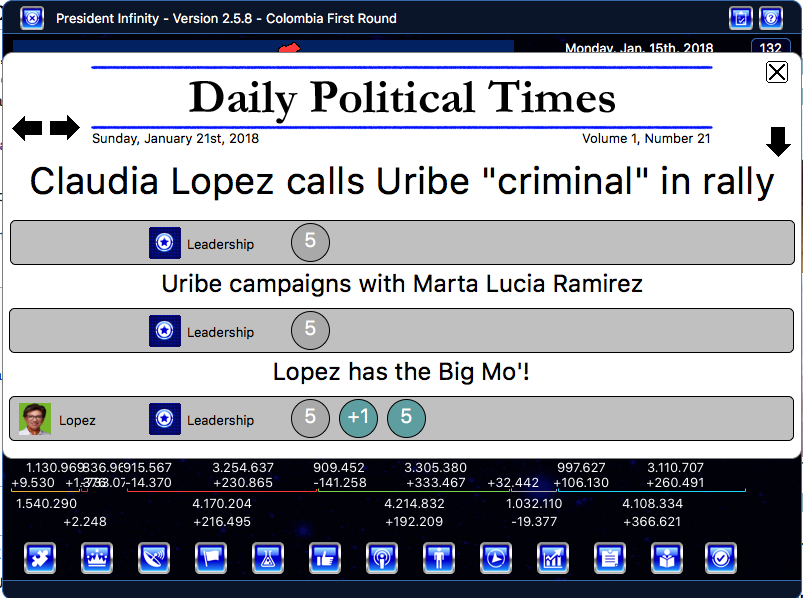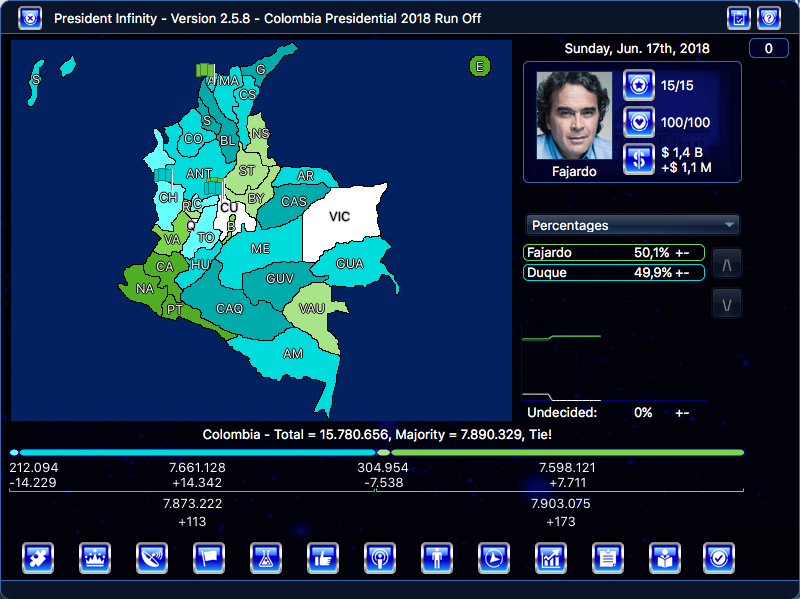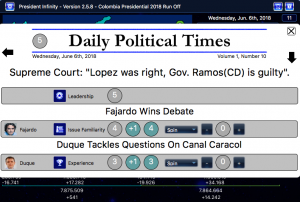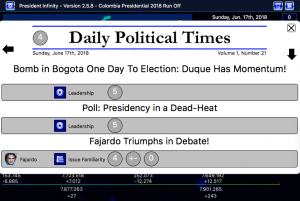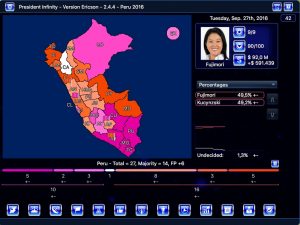Colombia Presidential 2018 Election

Colombia Presidential 2018
Colombia faces a historic moment in 2018. For the first time in history, the FARC terrorist group will no longer be a threat to the public security, due to the peace process that concluded in 2017. Although the country should be unified towards the post-conflict, Colombian society remains polarized by the policies and contents negotiated in the peace process. Colombians view negatively by a 70%-30% or even 80%-20%, some of the content in the peace process with FARC terrorist group. The most negatively view aspects of the peace treaty is the possibility of FARC members become automatically members of Congress and also the impunity for which they will not face justice for their decades of committing crimes.
Context: In 2010, Juan Manuel Santos was elected to continue-then president Alvaro Uribe accomplishments, Uribe played heavily to elect Santos as his successor, in order to continue the war against terrorists and rebels to bring security after decades of Colombia being a failed state. With Uribe and Colombia’s “democratic security” policy, investor confidence and the economy re-ignited. During Uribe’s 8-year government Colombia went from being a failed state, with a weak and fragile economy, to become a regional power and almost all territory lost to FARC over decades was recovered, that’s why Colombians view Uribe and his government highly. But something unexpected happened, after Santos was elected with Uribe’s support, Santos broke all links to Uribe and changed the national topic of war against the terrorists, to peace with the rebels. FARC were no longer a terrorist group to wage war with, but instead a rebel group with which the government must make a peace process, even if it imply giving them seats in Congress and impunity to their decades of crimes. Uribe became the strongest voice against the peace process, polarizing the Colombian society.
In the 2014 election, Uribe now Santos political enemy, founded his own party, Centro Democratico(Democratic Center), with candidates to Congress and the presidency. Uribe’s chosen candidate for president was Oscar Ivan Zuluaga, which make it to the second round in first place with 29%, and Santos in second place with 24%. In the run off ultimately the hope of a peace process helped Santos and he won over Zuluaga 50%-45%.
In 2016, Santos asked the Colombian people in a plebiscite if they supported the content of the peace process. During a 2-month political campaign Uribe and his party weighted heavily for NO, while the government and Santos for YES. The results were astoundingly close, 50.1% for NO to 49.9% for YES. After Santos admitted defeat, Uribe claimed victory and begun the campaign the reclaim the presidency in 2018, in order to dismantle the peace process deals with FARC. Santos received a week later the Nobel Peace Prize.
During 2017, simultaneous conversations begun between different political parties and movements to go united to the 2018 presidential election.
1. Democratic Center, The Conservatives and United for the Family (Right-To Far Right): The “Democratic Center” of President Uribe, proposed going together with the parties and movements that supported the “No” against the plebiscite of Santos peace process, which includes the “Conservative Party” and popular movements of christians, right-wing figures and movements against same sex rights. This coalition was the same that got 50.1% for NO in the plebiscite. The “Conservative Party” accepted to push talks with Uribe’s “Democratic Center” to go united with the same presidential candidate to the first round of the 2018 presidential elections, making a fierce opposition to the peace process and Santos government which has a 20% approval rating. The “Conservative Party” has former Uribe’s defense minister Marta Lucia Ramirez as candidate, while the “Democratic Center” of Uribe, has several candidates: senator Ivan Duque, senator Maria del Rosario Guerra, senator Paloma Valencia, former minister Rafael Nieto and former minister Carlos Holmes Trujillo. As an independent from “Strong for the Family”, former Procurator General of the Nation, Alejandro Ordoñez, is also participating in this coalition. The presidential candidate of these three parties will be selected in a national primary held in March 2018 the same day in which the Colombian people vote for Congress. The candidates participating will be Ramirez for the Conservatives, Ordoñez for his movement “Strong for the Family” and Uribe’s candidate for “Democratic Center”. Only Uribe’s candidate has not being selected to date. The winner will became the coalition Conservatives-Democratic Center-United for the Family candidate for president in the first round in May 2018, the second place will be the vice presidential candidate and the third place will be “granted great participation in a government if the coalition wins the presidency”. The main topic will be oppose to Santos government and opposition to the peace process.
2. Green Alliance, Compromise Citizens for Colombia and Alternative Democratic Pole (Center to Center Left). The coalition “Against Corruption”, is also celebrating a intra-party primary in March 2018, the same day the elections for Congress. In that primary they are going to participate the following candidates: Sergio Fajardo from “Compromise Citizens for Colombia” was Antioquia’s former governor and former mayor of Medellin, the second most important city in Colombia. Fajardo has been projecting himself as a different type of national figure over the past 10 years against the way politics is done in Colombia, he’s being talking as a person-not-politician that invests in education and fiercely against corruption. Corruption is something that Colombians value as the worst problem facing the country by a wide margin over the peace process, FARC or anything else. Fajardo is the best regarded politician in Colombia, with negative opinion of him in single digits, and positive opinions of him in between 50% to 60%. In this coalition will also participate Senator Claudia Lopez from Green Alliance, Lopez was surprisingly elected to the Senate in 2014 without having any political grassroots or politicians behind her. Her success was attributed that she has become the fiercest voice against corruption in Colombia, she tells “things like it is”, her judicial complaints have sent several Radical Change Party and Democratic Center politicians to jail, making her a nightmare for the establishments way of working. Senator Jorge Robledo is also participating in this alliance as the candidate of “Alternative Democratic Pole” the biggest left-wing party in Colombia, in the Senate Senator Robledo was the biggest opposition leader during Uribe’s 8-year presidency, accusing his ministers of corruption and multiple scandals. He has done the same to Santos. Robledo is not as popular as Lopez or Fajardo according to polls, but he is the Senator with the most votes in Colombia, around 250,000 and has a die-hard following of supporters. The winner of this coalition primary in March will became the candidate for president for Green Alliance-Compromise Citizens-Democratic Alternative Pole and the second place will be awarded the vice presidency. Corruption, the way politics works in Colombia, prioritizing education and calling “Uribe and Santos the same thing” will be their main topic.
3. The government-sponsored “United for Peace” alliance is being worked out by the Liberal Party, Social Party of the National Unity, with the participation of Clara Lopez “We Are All Colombia”. (Right to Left Wing). The Liberal Party currently in Santos government proposed an alliance that defends the peace process from Uribe’s candidate, their candidates are; Santos former Minister Juan Cristo, Liberal Senator Juan Manuel Galan and peace process chief negotiator and former Liberal vice president Humberto De La Calle. The Social Party of the National Unity, the largest party in Congress, also in this coalition is in crisis, the party was founded to support Uribe in 2004, calling it “Party of the U(U for Uribe)”, but abandoned him to support Santos, now that Santos is in 20% approval rating, the senators and representatives are trying to dismantle the party in order “to support whatever candidate they want”. But all points out that Santos position to make an alliance with the Liberals will materialize. Currently the party has two candidates for president, former Santos minister Juan Carlos Pinzon and senator Roy Barreras, two very unknown figures compared to the rest of the candidates for president. Clara Lopez “We are All Colombia” movement, who was the “Democratic Alternative Pole” candidate in 2014 obtaining 2 million votes resigned her party after the election of Jorge Robledo as the presidential candidate. Lopez, who was a minister in Santos government by then, couldn’t make it to the selection process and opted to remain in the government, later to resign her party and make an independent bid to the presidency. She is interested in going into an intra-party coalition with the Liberals to go together to the first round of the presidential election having the defense of the peace process as their main topic.
4. Former Vice president German Vargas Lleras; Radical Change Party (Right wing). A highly known figure, Vargas Lleras comes from the establishment and has made alliances throughout the country with highly questioned local politicians, making him to the eyes of Colombians as a politician that makes anything to get to power at whatever cost. He is the very essence of the establishment and the way politics works. His alliances had made toll on his favorability, he has supported governors, senators, mayors, etc who later had ended in prison for murder, narcotrafficking, corruption and links with illegal groups. They’re dozen of cases. However, Vargas Lleras remains a strong candidate. Since resigning as Santos vice president, he has been traveling to five cities/communities/towns per day to make deals with local politicians in order to organize his presidential bid for 2018. He is rapidly accumulating local establishment politicians support and will have the largest political machinery, but sometimes that’s not enough, precisely in a year were nobody wants to go alone to the first round of the presidential elections. Even him, has made private and public calls to the Liberal Party(from which he was a member) and has been publicly rejected for now. He offered the vice presidency to the Liberal former representative Simon Gaviria, son of the former president Cesar Gaviria, current leader of the Liberal Party. But, Liberal leaders don’t like him personally and that has closed the door to a possible alliance, for now. Vargas Lleras has also called on the Social Party for National Unity(Party of the U) to support him, but has found the same resistance to his name. Presidential candidates from those two parties have criticized him hardly and no alliance seems possible at the moment. Specially because those two parties support Santos peace process in Congress, and were heavily for the YES in the Plebiscite, while Vargas Lleras as vicepresident of Santos, was a critic of the peace process and members of his Radical Change Party opposed the Plebiscite. Vargas will likely adopt an opposition to the peace process in his campaign. (Right wing)
5. Former mayor of Bogota Gustavo Petro; “Human Colombia”. Petro was a Senator of Democratic Alternative Pole during Uribe’s 8-year presidency, and received one of the highest amount of votes nationally for the senate and was a fierce opposition leader, receiving death threats daily and living in different hotels to avoid an assassination attempt. Petro is a radical-left-wing leader, sympathizing with Venezuelan presidents Hugo Chavez and Nicolas Maduro. Petro was also elected major of Bogota, Colombian capital, in 2011 with 32% of the vote. He was removed from office and sanctioned from participating in politics for 18 years later by then Procurator General of the Nation, Alejandro Ordoñez(far-ring wing), for irregularities in Petro’s decisicion to nationalize the garbage recollection of the city of Bogota. Petro posed as a martyr of the establishments private profit businesses and received national media attention in his rallies and protests, he later received protection from Inter-American Commission on Human Rights which ordered the suspension of the decision of removal of his office and suspension of the sanction that prohibited Petro from seeking office for 18 years. Then president Santos, re-established Petro as the mayor of Bogota. But things did not ended there, a re-call vote process to remove Petro democratically begun, and after months of Petro contesting that process in the courts, it failed to make to it to the ballot box. He eventually ended his term as mayor without having the re-call taken place and is now an official candidate for president of Colombia with his movement “Human Colombia”. He has fiercely criticized the Green Alliance-Compromise Citizens and Democratic Alternative Pole for not inviting him into their coalition, but truth is, nobody want’s him near, given the hummanitary, political, economic and social crisis in the nearby collapsing Venezuela. Colombia has been witnessing the colapse of Venezuela under Chavez-Maduro regime, and that has affected the opinion Colombians have on that type of left-wing-politics that has a single digit approval and a 90% disapproval. Even thought Petro will try to focus the debate on the poverty and the social inequities in Colombia, the collapsing Venezuela crisis unfolding every day has reached such high levels, proven by the fact that Colombia is now flooded with Venezuelan immigrants, that might by it for Petro’s chances to become the next president.
Colombia Presidential 2018
Colombia Presidential 2018


